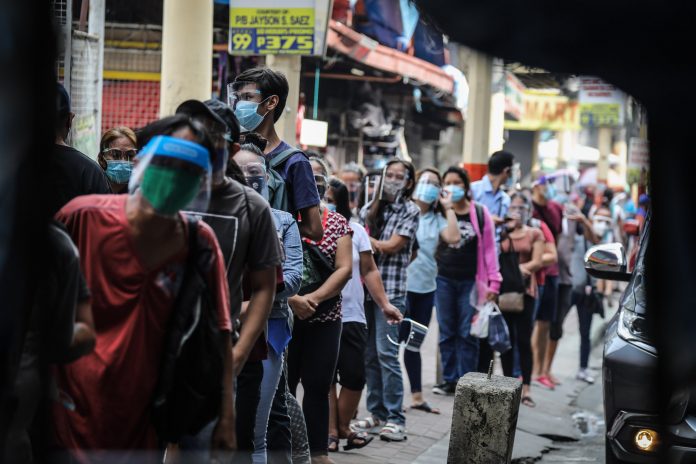As the number of new coronavirus disease infections in the Philippines continues to rise, Filipinos expressed fear that their quality of life will worsen in the coming months.
A survey done by pollster Social Weather Stations (SWS) showed that 36 percent of adult Filipinos believe their quality of life will worsen in the next 12 months.
The survey result, which was released on August 21, noted that the 36 percent are considered “pessimists,” 26 percent are “optimists,” or those who said they expect their lives to improve, while 30 percent said they expected their lives to stay the same.
The figures are an improvement in outlook as 43 percent were considered pessimists in May, the highest percentage so far in the 37-year quality-of-life series of the survey agency.
The recent figure at 36 percent, however, is still the second worst level of pessimism, surpassing the previous record of 34 percent in 2005.
In a statement, the SWS said the net optimism in the recent survey is “very low” at -10. The net optimism was computed by subtracting the pessimists for the optimists.
“Net Optimism is rarely negative. Only 10 percent of all SWS surveys recorded a score of net zero or lower. Moreover, only 5 out of 137 observations are within very low range,” read the SWS statement.
The presidential palace said the survey results “is an issue that concerns the administration (of President Rodrigo Duterte).”
Government spokesman Harry Roque said the coronavirus pandemic and the resulting quarantine restrictions “adversely affected the socio-economic conditions” of the people.
Roque said the government has already prepared a “whole-of-society program in our recovery plan” to mitigate the impact of the economic recession.
“We hope to revitalize the economy and stimulate growth for the betterment of the lives of our people,” said Roque.
Earlier, Secretary Karl Kendrick Chua of the National Economic and Development Authority, announced that the government will focus on “rebalancing its priorities from saving lives from the [new coronavirus disease] to saving lives from other factors, such as hunger and other diseases.”
In an earlier survey released this month, the SWS noted that joblessness among adult Filipinos has reached a record high as the country continues to battle a growing number of new coronavirus infections.
The pandemic has resulted in the temporary closure of offices, factories, markets, and shopping malls, displacing thousands of workers since March.
The survey said that 45.5 percent of the country’s adult population have become jobless, half of whom lost their jobs during the pandemic.
The Social Weather Stations said the estimated numbers of jobless adults were 27.3 million in July 2020 and 7.9 million in December 2019.
On Sunday, August 23, the Philippines’ COVID-19 caseload neared 190,000 as over 2,000 new cases were added to the tally.
More than 16,000 new recoveries were also reported due to the Department of Health’s weekly time-based counting of recoveries.
The Health department announced 2,378 new coronavirus cases on Sunday, bringing the country’s total confirmed cases to 189,601. Of the total number, 55,236 are active cases.
Almost half of the newly reported cases or 1,022 are from the national capital Manila.
It was the lowest one-day tally for new cases since July 29, when 1,874 new cases were reported.
From July 30 to August 22, new cases exceeded 3,000 daily, except on August 11, when it went just below that threshold, at 2,987.
The Health department also reported 16,459 new recoveries, for a total of 131,367 recoveries in the Philippines.









